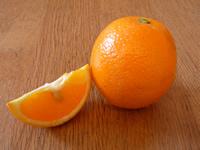 If you're after an antioxidant, try oranges.AddStyle
If you're after an antioxidant, try oranges.AddStyleIf you're in the market for an antioxidant to keep your body young and healthy, new research suggests you'd be much better off with oranges than vitamin C tablets.
Although vitamin C is best known for its protection against scurvy and, possibly, the common cold (see 'Vitamin C best in the cold'), fruits rich in vitamin C are also powerful antioxidants that protect cellular DNA from being damaged by oxidation. Going without such foods leads to DNA damage long before the iconic bleeding gums of scurvy are seen.
But do vitamin C pills on their own have the same protective effect as fruit? Serena Guarnieri and a team of researchers in the Division of Human Nutrition at the University of Milan, Italy, designed a simple experiment to find out.
The team gave test subjects a single glass of blood-orange juice, vitamin-C-fortified water, or sugar water to drink. The blood-orange juice and the fortified water had 150 milligrams of vitamin C each, whereas the sugar water had none. Blood samples were taken from the test subjects 3 hours and 24 hours after their drink. Unsurprisingly, blood plasma vitamin C levels went up after drinking both the juice and the fortified water.
The blood samples were then exposed to hydrogen peroxide, a substance known to cause DNA damage through oxidation. The damage was significantly less in the samples taken from volunteers who had ingested orange juice, in both the samples collected 3 hours after consumption and 24 hours after the drink. Unsurprisingly, the sugar water had no protective effect. But neither did the vitamin-C-fortified water.
ADVERTISEMENT
At least one other study, which looked at larger quantities of vitamin C, has shown a protective effect from the vitamin alone. But the fact that it doesn't show up here indicates that something more complicated is going on, says Guarnieri. "It appears that vitamin C is not the only chemical responsible for antioxidant protection; there is something more at work here," she says. The find is reported in the British Journal of Nutrition1.
"It is an important observation," says David Heber, director of the Center for Human Nutrition at the University of California, Los Angeles. It suggests that people studying the effects of the vitamin should be careful to note where in the diet it comes from. "Vitamin C is provided in a matrix in fruits with many other beneficial substances," he says; and all of these may interact with each other.
Other nutrition researchers have suggested that sugars in juice interact with vitamin C to generate the antioxidant effect2. But Guarnieri suspects that the phytochemicals found in oranges (cyanidin-3-glucoside, flavanones and carotenoids) are the substances that need further study. "But how they are interacting is still anyone's guess," she adds.
Visit our provesbetterthanvitam.html">newsblog to read and post comments about this story.
